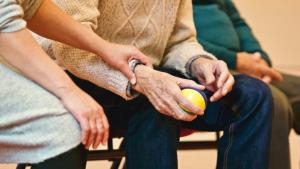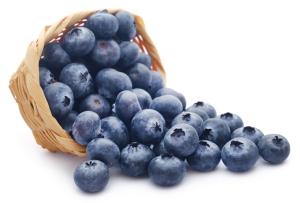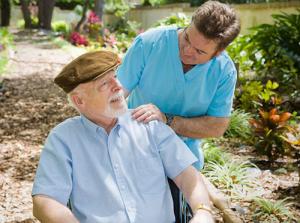by Amber Kevlin, RN | Oct 19, 2023 | Senior Home Care
As seniors age, maintaining a healthy diet and exercise routine becomes increasingly important for their overall well-being. In-home care providers play a crucial role in directing elderly exercise and diet routines. This helps individuals in adopting and maintaining a healthy lifestyle.
A balanced diet is crucial for seniors to meet their nutritional needs and maintain a healthy lifestyle.
 It is recommended that a diet for seniors consists of a variety of nutrient-dense foods. Examples are lean proteins, fruits, vegetables, low-fat dairy products, and whole grains. Seniors should also aim to limit their intake of saturated fats, added sugars (look for the labels that say “No Added Sugars!”), and sodium.
It is recommended that a diet for seniors consists of a variety of nutrient-dense foods. Examples are lean proteins, fruits, vegetables, low-fat dairy products, and whole grains. Seniors should also aim to limit their intake of saturated fats, added sugars (look for the labels that say “No Added Sugars!”), and sodium.
In terms of specific dietary recommendations for seniors, it is important to focus on foods that promote bone health. Some examples are calcium-rich dairy products or fortified alternatives like almond milk or tofu. Additionally, incorporating foods high in fiber can help with senior digestive health and prevent constipation which can be common among older adults.
Regular physical exercise for seniors is equally important
It helps improve balance, flexibility, strength, and overall cardiovascular health. Engaging in exercises such as cycling, swimming, walking, or even light weightlifting can have numerous benefits. However, it’s crucial to consult with a healthcare professional before starting any new exercise regimen to ensure safety.
For those who may have limited mobility or other physical limitations due to age-related conditions or disabilities; there are still plenty of senior diet options available. Chair exercises or gentle stretching routines can be done from the comfort of home while providing significant benefits.
A healthy senior diet improves quality of life and health
By following a healthy diet plan tailored to their needs along with regular elderly exercise routines suitable for their abilities; seniors can significantly enhance their quality of life and maintain optimal health as they age. In-home care providers play an essential role in supporting elderly individuals in adopting these lifestyle changes. They provide guidance on nutrition choices and assisting with physical activities when needed.
Are you or a loved one looking for diet and nutrition help at home? My Choice Home Care is an in-home elderly home care service that serves clients in Macon, Jackson, and Haywood Counties in North Carolina. Counties served in Georgia are Rabun, Towns, and Habersham. Counties served in Upstate South Carolina are Oconee, Pickens, and Anderson. Email us or call (828) 200-9000 to speak to someone today if you or a loved one would like to enjoy the benefits of living independently in your own home. We offer a free Elderly Care Options guide to help you navigate Medicare, Medicaid and other programs for seniors.
by Amber Kevlin, RN | Oct 14, 2023 | Senior Home Care
In-home care is an incredible opportunity when a senior is in need of companionship. Aides and caregivers can provide senior companion services which can help battle feelings of loneliness. Isolation can become a common experience in elderly adults. Companionship can make all the difference.
 Senior companionship provided by caregivers not only offers social interaction but also promotes mental stimulation. Engaging in conversations, playing games, reading together, or simply sharing stories can help seniors keep a sharp mind and prevent further cognitive decline. Furthermore, having a companion at home ensures that seniors have someone they can rely on for assistance with daily activities such as meal preparation, medication reminders, light housekeeping, and transportation. This support enables them to maintain independence while ensuring their comfort and safety.
Senior companionship provided by caregivers not only offers social interaction but also promotes mental stimulation. Engaging in conversations, playing games, reading together, or simply sharing stories can help seniors keep a sharp mind and prevent further cognitive decline. Furthermore, having a companion at home ensures that seniors have someone they can rely on for assistance with daily activities such as meal preparation, medication reminders, light housekeeping, and transportation. This support enables them to maintain independence while ensuring their comfort and safety.
In-home care services also provide respite for families caring for elderly loved ones.
Knowing that a trained caregiver is present to offer companionship and support can alleviate stress for family members. Especially those who may have other responsibilities or need time for self-care. Ultimately, the benefits of companionship for seniors through in-home care are invaluable. It not only enhances their quality of life but also contributes to their physical health in a very real way.
- A lower risk for cardiovascular disease. People that suffer from loneliness are 32% more susceptible for a stroke and 29% more likely to develop heart problems than people that engage in social activities.
- Lower risk for dementia, as keeping socially engaged also keeps the mind engaged, improving cognitive functioning.
- Emotional balance, as being lonely can increase the risk for depression and anxiety.
Are you or a loved one looking for elderly companionship at home? My Choice Home Care is an experienced in-home care service agency that serves clients in Macon, Jackson, and Haywood Counties in North Carolina. Counties served in Georgia are Rabun, Towns, and Habersham. Counties served in Upstate South Carolina are Oconee, Pickens, and Anderson. Email us or call (828) 200-9000 to speak to someone today if you or a loved one would like to enjoy the benefits of living independently in your own home. We offer a free senior care consultant guide to help you navigate Medicare, Medicaid and other programs for seniors.
by Amber Kevlin, RN | Oct 9, 2023 | Senior Home Care
What happens when a loved one is placed on Hospice? What does it mean for my family, and how does it work? These are common questions that come up when a loved one has been “put on hospice.” Below, these questions and more will help to guide you through the steps of hospice, and how to navigate the journey with your family.
Sometimes towards the end of the aging process, a person’s body may stop responding to treatment, and this is usually a sign doctors look for when considering hospice. Being placed on hospice means that the person has roughly less than six months to live. Once the doctor has recommended hospice services, a trained nurse will complete an assessment to see if the person is eligible for services. When services are approved, hospice can assist with many issues that stem from end-of-life care.
 Hospice Family Care Support Helps with:
Hospice Family Care Support Helps with:
- Symptom management and medication administration
- Weekly duties such as bathing and routine assessments
- Providing counseling and spiritual advisement for grieving family
- Provide or arrange transportation if needed to medical facilities
In general, hospice exists to ease the pain of a loved one in the end-of-life- stages. This helps an overwhelmed family deal with the inevitability of loss. Palliative-trained nurses can help to create a plan, alleviate pain, and guide the family through the stages of death and grief. Even if your loved one already has in-home care services, hospice is an incredible supplemental service. It can greatly benefit your loved one and family.
During the Transition
In the active stages of dying, hospice will be nearby to help the client and the family during transition. There are signs that a dying body will present with, and hospice nurses are trained to recognize them. Once the client’s body begins the transition, medications are usually administered to ensure that the transition is a painless one. Family is then encouraged to be with the family member until they pass away.
Directly after passing, and after the family has spent time with their loved one, the hospice nurse will perform post-mortem care. The family may participate as much as they would like, or not participate at all. The death must also be officially pronounced, and then arrangements that were made beforehand are put into place, such as a call to the funeral home to begin preparations for the body.
Hospice Family Support
Of course, every family may have different traditions peppered in, depending on spiritual or religious preferences. Hospice welcomes and encourages families to surround the loved one and participate as much as possible in any and all activities involving their loved one during the final transition. Reach out to your local hospice care professionals should you have any more questions for your family or loved ones.
Are you or a loved one looking for help at home? My Choice Home Care is a senior home care service company that serves clients in Macon, Jackson, and Haywood Counties in North Carolina. Counties served in Georgia are Rabun, Towns, and Habersham. Counties served in Upstate South Carolina are Oconee, Pickens, and Anderson. Email us or call (828) 200-9000 to speak to someone today if you or a loved one would like to enjoy the benefits of living independently in your own home. We offer a free Senior Care Options guide to help you navigate Medicare, Medicaid and other programs for seniors.
by Amber Kevlin, RN | Oct 4, 2023 | Senior Home Care
A common challenge that often seems to creep up on seniors is being able to safely prepare nutritious meals for themselves as they age. Taking the time to evaluate and prepare, and even asking for help can make senior meal prep much easier. We have some tips and tricks to help you make this happen!
Sitting down and writing out a menu for the week is helpful in figuring out what you have on hand, and what you may need to pick up at the store. Enlist the support of a friend or neighbor if the task seems daunting. This gives you some company along with the assistance. Another tip is to make a menu around versatile ingredients that can be used to make many different meals.
Easy Senior Meal Prep Foods:
 Fresh berries, which are good as a snack, a side or in a bowl of cereal or oatmeal.
Fresh berries, which are good as a snack, a side or in a bowl of cereal or oatmeal.- Eggs are a great source of protein and can be made many ways! Enjoy deviled eggs, boiled eggs, scrambled eggs, or just a simple sunny side up on a piece of toast.
- Peanut butter is another great source of protein. It works wonderfully as dip for fresh veggies such as celery, or a spread topping on top of a bagel or toast.
- Pre-packaged meals are convenient for when you don’t feel like cooking, and there are many healthier options today than in the past.
- Most grocery stores now offer pre-sliced fruits and vegetables for a quick snack without the work, such as sliced apples, watermelon, carrots, peppers and diced onions and tomatoes as well.
- High protein options for when you just aren’t feeling like a full meal. Ensure can help ease a troubled stomach, but keep you nourished and hydrated as well.
- Be sure consistent water intake is part of the daily diet to prevent dehydration for elderly seniors as well.
Know When Help is Needed for Preparing Meals
Recognizing when yourself or a loved one is no longer able to prepare food safely is essential for preventing injury. Diminished strength, shaky hands and dubious knife skills set in. Memory issues that result in an oven being left on for extended periods of time. To avoid this danger extra assistance may be needed in the home. While Meals on Wheels is a wonderful resource, many operations are on hold due to lack of volunteers or funds. You or a loved one may consider the remerging trend of intergenerational living or in-home care services for assistance as an option.
Are you or a loved one looking for help at home? My Choice Home Care is a senior home care service company that serves clients in Macon, Jackson, and Haywood Counties in North Carolina. Counties served in Georgia are Rabun, Towns, and Habersham. Counties served in Upstate South Carolina are Oconee, Pickens, and Anderson. Email us or call (828) 200-9000 to speak to someone today if you or a loved one would like to enjoy the benefits of living independently in your own home. We offer a free Senior Care Options guide to help you navigate Medicare, Medicaid and other programs for seniors.
by Amber Kevlin, RN | Sep 28, 2023 | Senior Home Care
Everyone knows that high blood pressure is a danger to your health, but low blood pressure, also called hypotension, is rarely talked about. While for the most part, low blood pressure is not an emergency situation unless you experience unsettling symptoms, it’s still best to keep a close eye on, and report any low readings and side effects to your primary care physician.
Low blood pressure means that the force needed to push blood throughout the body is lower than it should be. If you are not feeling any effects, you may be fine without interventions, but what makes low blood pressure so dangerous is the risk it can pose to seniors for falls when light-headedness and dizziness are effects. An extremely low blood pressure can even cause shock or even death. This may happen when organs are deprived of the oxygen and nutrients they need to function.
 At this time, the regularly accepted “normal” blood pressure reading is 120/80 mm Hg or lower. But just like every other regulatory system in the body, this number can change due to many circumstances, such as age, lifestyle choices (drinking alcohol and smoking tend to raise blood pressure), as well as stress levels and nutrition. A slight rise may be normal for someone 80 years old, with a reading of 138/86 mm Hg.
At this time, the regularly accepted “normal” blood pressure reading is 120/80 mm Hg or lower. But just like every other regulatory system in the body, this number can change due to many circumstances, such as age, lifestyle choices (drinking alcohol and smoking tend to raise blood pressure), as well as stress levels and nutrition. A slight rise may be normal for someone 80 years old, with a reading of 138/86 mm Hg.
So, what is considered low blood pressure in seniors?
Typically, any reading of 90/60 mm Hg or below is a low reading. If you or a loved one are experiencing any of the listed signs and symptoms of low blood pressure, please seek medical advice immediately:
- Weakness
- Extreme fatigue
- Fainting
- Rapid or irregular heartbeat
- Nausea
- Blurry vision
- Confusion
- Shallow breathing
If you aren’t experiencing severe symptoms but feel a bump in your blood pressure may be warranted to reduce mild symptoms, try these tips at home:
- Increase sodium intake, wisely. Make sure a doctor can advise you for an increase in sodium intake in your health care plan.
- Drink more water! An increase in fluids means an increase in fluid volume, therefore raising blood pressure and preventing senior dehydration.
- Compression stockings can help circulate blood from the legs back to the heart.
- Exercise regularly. Yes, you see this a lot, but because it’s truly so helpful in every aspect of personal health care.
While these tips may help at home, make sure to always keep your doctor informed of any lifestyle changes, and if any symptoms persist or interfere with your daily life. Medications may be prescribed to help with low blood pressure.
Are you or a loved one looking for help at home? My Choice Home Care is a senior home care service company that serves clients in Macon, Jackson, and Haywood Counties in North Carolina. Counties served in Georgia are Rabun, Towns, and Habersham. Counties served in Upstate South Carolina are Oconee, Pickens, and Anderson. Email us or call (828) 200-9000 to speak to someone today if you or a loved one would like to enjoy the benefits of living independently in your own home. We offer a free Senior Care Options guide to help you navigate Medicare, Medicaid and other programs for seniors.
by Amber Kevlin, RN | Sep 24, 2023 | Senior Home Care
Strokes can happen at any time, anywhere, to anyone. It also means that every stroke survivor recovers at different rates, depending on many different factors.
However, there are ways to encourage “neuroplasticity,” or to give your brain a boost in growth that can make stroke recovery more efficient.
Guidance for Recovering from a Stroke:
 Repetition is essential in recovering lost skills due to a stroke. Repetition helps to rewire the brain and overcome memory loss by providing stimulation. Some repetitive movements such as leg exercises may help a survivor regain the ability to walk again.
Repetition is essential in recovering lost skills due to a stroke. Repetition helps to rewire the brain and overcome memory loss by providing stimulation. Some repetitive movements such as leg exercises may help a survivor regain the ability to walk again.- On the other hand, don’t overdo it. The body and brain do need rest to heal stroke symptoms, and overexertion can extend your road to recovery.
- Even if you are unable to do certain physical stroke recovery exercises, give it a try anyway, as long as it’s safe. Does tying your shoelaces seem impossible? Keep trying, and don’t get discouraged. These skills will be hard to recover if you refuse to try.
- If speech is an issue, use mobile apps to improve! There are many apps online that are good for speech therapy, using repeat-back technology to gauge words and sounds, and offer encouraging tips.
- Use respite care. There are resources available to seniors and those in need of some extra care, or help for their family that are also caregivers. Look into local in-home service agencies that can provide aides to help around the house, or with personal care needs, such as bathing or grooming.
Recovery isn’t a straight line. There may be dips, regressions, or plateaus, but don’t give up! Stay consistent, and stay positive during your stroke healing journey.
At home stroke recovery can be challenging, but it is far from impossible. Understand and accept that recovery takes time. Develop your healing practice by building a practical stroke recovery timeline.
Make a promise to yourself of being gentle and compassionate with your body and mind. This is foundational to overcoming the obstacles that a stroke presents. If you feel overwhelmed or discouraged, ask for help. And when help is offered, it’s okay to accept.
Looking for help at home? My Choice Home Care is an in-home elderly home care service that serves clients in Macon, Jackson, and Haywood Counties in North Carolina. Counties served in Georgia are Rabun, Towns, and Habersham. Counties served in Upstate South Carolina are Oconee, Pickens, and Anderson. Email us or call (828) 200-9000 to speak to someone today if you or a loved one would like to enjoy the benefits of living independently in your own home. We offer a free Senior Care Options guide to help you navigate Medicare, Medicaid and other programs for seniors.
 It is recommended that a diet for seniors consists of a variety of nutrient-dense foods. Examples are lean proteins, fruits, vegetables, low-fat dairy products, and whole grains. Seniors should also aim to limit their intake of saturated fats, added sugars (look for the labels that say “No Added Sugars!”), and sodium.
It is recommended that a diet for seniors consists of a variety of nutrient-dense foods. Examples are lean proteins, fruits, vegetables, low-fat dairy products, and whole grains. Seniors should also aim to limit their intake of saturated fats, added sugars (look for the labels that say “No Added Sugars!”), and sodium.
 Senior companionship provided by caregivers not only offers social interaction but also promotes mental stimulation.
Senior companionship provided by caregivers not only offers social interaction but also promotes mental stimulation.  Hospice Family Care Support Helps with:
Hospice Family Care Support Helps with: Fresh berries, which are good as a snack, a side or in a bowl of cereal or oatmeal.
Fresh berries, which are good as a snack, a side or in a bowl of cereal or oatmeal. At this time, the regularly accepted “normal” blood pressure reading is 120/80 mm Hg or lower. But just like every other regulatory system in the body, this number can change due to many circumstances, such as age, lifestyle choices (drinking alcohol and smoking tend to raise blood pressure), as well as stress levels and
At this time, the regularly accepted “normal” blood pressure reading is 120/80 mm Hg or lower. But just like every other regulatory system in the body, this number can change due to many circumstances, such as age, lifestyle choices (drinking alcohol and smoking tend to raise blood pressure), as well as stress levels and  Repetition is essential in recovering lost skills due to a stroke. Repetition helps to rewire the brain and
Repetition is essential in recovering lost skills due to a stroke. Repetition helps to rewire the brain and
Recent Comments